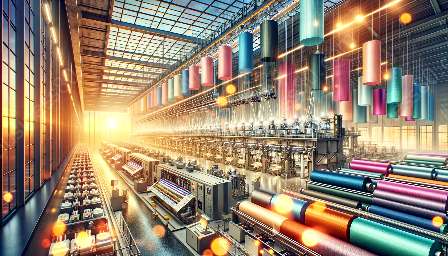Sustainable manufacturing has become an increasingly important topic within the apparel manufacturing and textiles & nonwovens industries. As global awareness of environmental issues continues to grow, companies are seeking ways to reduce their environmental impact, conserve resources, and promote social responsibility.
By adopting sustainable manufacturing practices, businesses in the apparel and textiles & nonwovens sectors can minimize their carbon footprint, decrease waste, and support ethical labor practices. This not only aligns with consumer demand for eco-friendly products but also helps companies improve their overall efficiency and reduce costs.
The Importance of Sustainable Manufacturing
Sustainable manufacturing involves the creation of products through processes that minimize negative environmental impacts, conserve energy and natural resources, and are safe for employees, communities, and consumers. For the apparel and textiles & nonwovens industries, sustainable manufacturing encompasses various aspects, including:
- Use of eco-friendly materials
- Energy-efficient production processes
- Waste reduction and recycling initiatives
- Worker well-being and ethical labor practices
- Social and environmental compliance along the supply chain
These practices are crucial for addressing the environmental challenges associated with traditional manufacturing methods in the apparel and textiles sectors. By embracing sustainability, businesses can contribute to a healthier planet while meeting the expectations of consumers who prioritize ethical and eco-conscious products.
Advancements in Sustainable Apparel Manufacturing
Several innovative techniques and technologies are revolutionizing sustainable manufacturing in the apparel industry. From utilizing recycled and organic materials to implementing water-saving dyeing processes, companies are exploring new ways to create environmentally responsible apparel without compromising style or quality.
One notable advancement in sustainable apparel manufacturing is the development of circular fashion systems, which prioritize the reuse, recycling, and upcycling of clothing. This approach aims to minimize textile waste and extend the lifecycle of garments, ultimately reducing the industry's environmental footprint.
Additionally, advancements in digital design and manufacturing technologies are enabling apparel companies to optimize production processes, minimize material waste, and offer more personalized, on-demand products, further contributing to sustainability efforts.
Sustainability in Textiles & Nonwovens Manufacturing
Similar to apparel manufacturing, sustainable practices in textiles and nonwovens manufacturing are playing a pivotal role in reshaping the industry. The sustainable manufacturing of textiles involves the use of environmentally friendly fibers, such as organic cotton, hemp, and bamboo, as well as the adoption of eco-conscious dyeing and finishing processes.
Furthermore, technological innovations, such as biodegradable and compostable materials, are driving the development of sustainable nonwovens, which have applications in various industries, including hygiene products, medical supplies, and automotive components.
By integrating sustainable practices into textiles and nonwovens manufacturing, companies can reduce their environmental impact and appeal to consumers seeking sustainable alternatives to conventional products.
Future Outlook
The future of sustainable manufacturing in apparel and textiles & nonwovens looks promising, with ongoing research and development leading to even more eco-friendly and socially responsible solutions. As consumer demand for sustainable products continues to grow, companies will be incentivized to further innovate and enhance their sustainable practices.
Moreover, collaborations and partnerships between industry stakeholders, academia, and government entities will likely drive the advancement of sustainable manufacturing, paving the way for a more sustainable and ethical future for the apparel and textiles & nonwovens industries.

